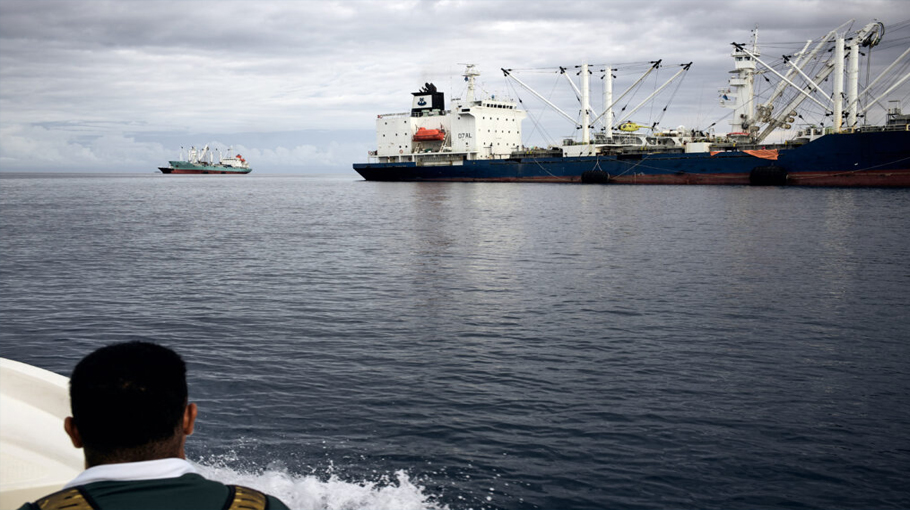Balancing erosion and opportunity in Pacific deep-sea mining

Pacific Islanders, stewards of the world’s largest ocean, are staring down the dire effects of climate change as ocean warming, severe cyclones and mass coral reef bleaching jeopardise their livelihoods.
The United Nations’ International Seabed Authority (ISA) has been charting a course to balance interests among all stakeholders — mining companies, investors, scientists, non-governmental organisations (NGOs) and nations around the world — in the pursuit of critical metals and the equal distribution of benefits.
The drive to develop this new source of key energy transition metals found in the Clarion-Clipperton Zone (CCZ), a deep abyssal plain midway between Mexico and Hawaii, is greatly influenced by the global shift away from fossil fuels and toward green technologies. The area has large deposits of nickel and cobalt-rich polymetallic nodules, resources in heavy demand as virtually all the world is involved in the quest for a net zero future.
ISA, founded in 1994, has upheld its mandate of providing equity in the exploration of seabed resources. The United Nations Convention on the Law of the Sea (UNCLOS) states that for every exploration license secured by a developed nation, a parcel of equal value was set aside for exclusive access by developing countries.
These mining operations must be carried out for the ‘benefit of humankind’, which is comparable to a just distribution of the sea’s resources. Pacific Islanders are all too aware that this is not simply a meaningless slogan but a legal principle. Starting with access to mineral resources, UNCLOS prevents any single state from making unilateral claims. Rich nations that initially aimed to assert exclusive rights to mineral resources in international waters cannot do so without ISA consent and adherence to its rules.
No country has operated outside of these boundaries since the inception of UNCLOS in 1982. Before then, deep-sea mining players were entirely comprised of developed, well-resourced nations.
Today, exploration contracts are held across a mix of developing and developed nations, from across the Indo-Pacific, Europe and Asia. This exemplifies equal participation, irrespective of social and economic systems, development status or geographical location.
There’s also the ISA’s recognition that Article 193 of the UNCLOS framework mandates the duty to safeguard and maintain the marine environment. Nauru, one of the world’s smallest nations with a total land area of only eight square miles, may lead developed nations in becoming the first country to collect nodules at commercial scale. Following extensive phosphate mining by Britain and Australia for most of the 1900s, only the outskirts of the island are inhabitable. Receding shorelines and a fall in near-shore fishing further accentuate Nauru’s economic fragility. UNCLOS promotes equitable sharing of financial benefits derived from the activities in the CCZ area. But equity has no fixed definition and is heavily impacted by precedent, cultural norms, the surrounding context and the characteristics of assets involved. Determining the specific royalties, taxes and profit-sharing requirements has been no simple task. According to UNCLOS, the payment plan should not favour or disadvantage seabed mining compared to mining on land for similar minerals.
Actual revenue from the commercial use of resources in the Clarion-Clipperton Zone depends on a variety of parameters including commodity prices, final payment regime under the ISA, nodule collection and processing technologies specific to each mining operation. The only exploration contractor to have defined these figures per internationally accepted mineral disclosure statements is Nauru Ocean Resources Inc., owned by The Metals Company.
The ISA is not alone in this endeavour. On a more modest scale, others are ironing out their own national seabed mining requirements including the Cook Islands, Norway and Japan. The Cook Islands have granted themselves three exploration licenses by their own Seabed Authority in 2022. Divisions persist among some island economies with Fiji, Papua New Guinea and Vanuatu advocating for a moratorium on such activities.
ISA’s regulatory guidelines, now under review, appear to be in alignment with the United States’ announced commitment to provide roughly US$800 million in aid to the vulnerable island nations in the Pacific. A full US$130 million of this will go toward bolstering the economies and early-warning systems for disasters in the region — increasing ‘climate resilience’.
James Borton is a non-resident senior fellow at Johns Hopkins SAIS Foreign Policy Institute and the author of Dispatches from the South China Sea: Navigating to Common Ground.
Source: East Asia Forum




